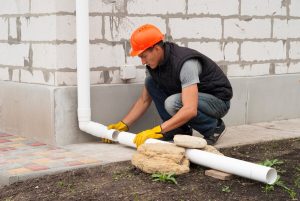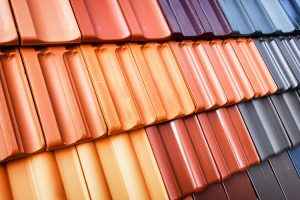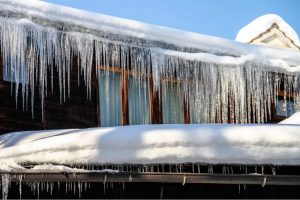Which Material is Better – Steel, Aluminum, or Vinyl?
Oct 24, 2023

Being a homeowner means constant maintenance on your property and home. With the weather turning, and winter approaching, an area of your home that you might want to consider re-evaluating are your gutters. Often overlooked and forgotten about, gutters are essential to the drainage of rainfall and precipitation from your home. If your gutters are in bad shape, you might need to replace them for the upcoming wet season.
Which Material is Better – Steel, Aluminum, or Vinyl?
It depends on your home and your budget. Aluminum is more expensive, but it is lighter, more resistant to rust and has a longer lifespan. Steel on the other hand is cheaper, more resistant to dents and can better deal with rapid fluctuations in temperature, which can cause thermal warping.
Vinyl gutters are made of PVC plastic, and this makes them resistant to dent and corrosion. They are easy to install because they are lightweight. Compared to other gutter materials, vinyl gutters are cheaper but are not ideal for areas with heavy rains, snow, or strong winds.
In addition, here’s a quick overview of why gutters are important in the first place . Seemingly more work to maintain than seems beneficial, gutters are actually one of the most important ways to prevent water damage to your home. They are installed in order to channel water away from the foundation of your home. Because of their design, the water that accumulates from rain or snow can easily flow away from your home, keeping the structural integrity of your house intact.
Additionally, poorly maintained gutters can lead to basement flooding, cracks in your foundation, soil erosion, dry-rot, paint damage, window and door damage, and mold. This is precisely why maintaining your gutters is of such critical importance. If you have sagging gutters, holes, or clogs (often debris from nearby trees such as leaves, twigs and mulch), getting your gutters fixed or replaced is wise.
While replacing your gutters isn’t something that you would need to do often, getting them cleaned and inspected is a good routine to develop so that should there be any critical damage, you can solve the problem before it becomes one. The average lifespan of gutters is generally around 20-30 years, but this number fluctuates depending on maintenance, preservation and care, and weather conditions in your area. Things that often become problems without routine cleaning and checks, and that can shorten the life expectancy of your gutters are the following:
Debris Accumulation
If loose debris such as leaves, mulch, and twigs aren’t regularly cleaned out, they quickly begin to decompose. This mass matts down and compresses into a solid damp sheet lining the gutter. This matter blocks the flow of water, causing clogs. In addition to generating clogs, if the matter isn’t damp but dry, it can become a fire hazard as well.
Gutter Damage
In lieu or in addition to your gutters becoming clogged from debris, damage can also occur in a multitude of ways. A way in which homeowners don’t realize is leaning ladders against the gutters to clean them out. While this sounds counter-intuitive, it all comes down to how the ladder is handled. It can be done successfully with a bit of planning, but a rough handling of the ladder against the gutters can damage them. Ice dam formations are also a culprit when it comes to damaging your gutters. Additionally, pest infestations, rust from clogged water, and storm and tree damage are all ways in which your gutters can become impaired.
When choosing new gutters, which is better: steel or aluminum? Often considered similar in many ways, the small differences between the two materials might work better for your home. Here are the pros and cons for both:
Aluminum
The cost of installing aluminum gutters is around $5.00-$9.00 per linear square foot. Not the cheapest available material, but much less expensive than copper or other high-end materials.
Pros:
- Highly resistant to rust, aluminum gutters are hardy and the metal doesn’t thin with time.
- Lighter in weight, aluminum gutters are easy to install.
- For customization, aluminum is easier to work with than steel, making seamless gutters a more accomplishable task.
- While both materials are long lasting, aluminum generally lasts around 20 years or longer when in the right environment and cared for properly.
- Available in a wide variety of colours, aluminum gutters can be made to match your home, unlike steel.
Cons:
- While durable, aluminum has the tendency to dent. If hit by ladders, trees, ice, hail or animals, the metal can get dings in it very quickly.
- Generally able to withstand most temperatures, aluminum doesn’t fare well in very hot temperatures or in rapidly changing temperatures. This kind of weather leads to splits, cracks and overall damage.
- Prone to leaks around the joints.
Steel
You have a choice between galvanized steel and stainless steel here, with both being very strong and durable. Galvanized steel is cheaper, making it more popular, but it also won’t last as long as stainless steel. Galvanized steel gutters cost around $4.00-$8.00 per linear square foot, making this lower on the price spectrum. Stainless steel gutters are generally around $20 per linear square foot, a much higher price than either galvanized steel or aluminum.
Pros:
- While very similar to aluminum in terms of durability and longevity, galvanized steel gutters are better when it comes to resisting dents, making them hold up better in areas with heavy winds.
- In hot or rapidly changing temperatures, steel holds up better than aluminum, as thermal warping isn’t an issue with this metal.
- Unlike aluminum gutters, ladders resting on steel gutters won’t be a problem and won’t cause damage.
Cons:
- Overall both materials are rust resistant, however when comparing them, galvanized steel will rust faster than aluminum, shortening their lifespan. Stainless steel gutters will never rust on the other hand.
- Steel gutters require a bit more maintenance when it comes to ensuring they stay rust-free. With constant checking of the zinc layer for holes (which leads to rust), this can be cumbersome.
- Heavier than aluminum, galvanized steel is harder to install, making those do-it-yourself types slightly more deterred. In addition to it being heavier, galvanized steel also requires soldering. Either DIY-ers will choose aluminum to work with, or they will call a professional, driving up the cost of the project.
- Some of the other available materials available for gutters are vinyl, which is a very easy to install option, and copper, which is rust resistant but very expensive.
- In short, while having any kind of gutters is better than no gutters, if you can afford the extra expense, steel gutters are the way to go if you live in the GTA, where winds can be high and temperatures fluctuate.
Vinyl Gutters
Vinyl gutters are affordable and easy to install. They will meet your needs if you’re on a tight budget or considering a DIY gutter installation. Vinyl gutters are ideal for a mild or dry climate. However, vinyl gutters aren’t as durable as metal gutters.
Pros:
- Vinyl or PVC gutters are popular because they are affordable and lightweight. The gutters cost as low as $3 to $5 per 10-foot section.
- Due to their lightweight nature, the gutters are easy to install and handle. They don’t require joints or riveting because their sections snap together, enhancing DIY installation and reducing the time and cost of professional gutter installation.
- Because vinyl gutters won’t corrode or rust, they are low maintenance. The gutters won’t dent even if they encounter poorly placed ladders or wind-blown tree limbs. Scratches and dings are less noticeable on vinyl gutters because the colour is embedded on the material and not powder-coated or painted. You don’t have to paint vinyl gutters to match your roof because the gutters come in a great variety of colours.
Cons:
- Vinyl gutters can’t hold up in areas that receive heavy rain, strong winds, or snow due to their lightweight nature. Vinyl gutters are mostly suited for mild or dry areas. Even if they are resistant to corrosion, they are prone to cracking and sagging and often don’t last very long. The gutters are only available in conventional sectional models. They are also more likely to leak because, unlike metal gutters, their seams aren’t soldered.
- In wet climates, vinyl gutters may not last for more than ten years. However, in dry climates and with regular maintenance, the gutters may last for up to twenty years.





